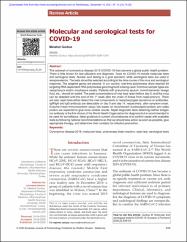Molecular and serological tests for COVID-19
Abstract
The outbreak of coronavirus disease 2019 (COVID-19) has become a global public health problem. There is little known for test utilization and diagnosis. Tests for COVID-19 include molecular tests and serological tests. Nucleic acid testing is a gold standard, while serological tests are used in seroprevalence. The tests should be selected according to the time course of the virus and serological response. The targeted genes are several. In our country, real-time polymerase chain reaction kit targeting RNA-dependent RNA polymerase gene fragment is being used. Common sample types are nasopharynx and/or oropharynx swabs. Patients with pneumonia sputum, bronchoalveolar lavage fluid, etc., should be tested. The peak concentrations of viral load reach before day 5, and the virus can be detected until the end of the 1st week after the onset of illness from nasal-pharynx. There are also rapid tests either detect the viral components in nasopharyngeal secretions or antibodies. IgM/IgA and IgG antibody are detectable on day 5 and day 14, respectively, after symptom onset. Enzyme-linked immunosorbent assay kits based on recombinant nucleocapsid protein and spike protein are expected to give more reliable results. Rapid diagnostic tests detecting neither antigen nor antibody is the first choice of the World Health Organization for diagnosis but is recommended to be used for surveillance. Ideal guidance in current circumstances is to confirm cases with available tests by following national recommendations so that we should take action as soon as possible, give appropriate therapy, and determine their contacts for infection prevention.
















